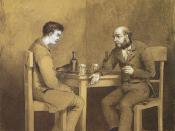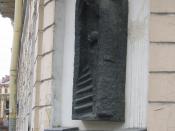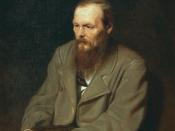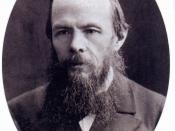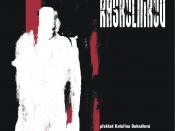The late 19th century has become the era when Russian prose was in full bloom. Never before had the writers such an influence on minds and souls of the audience, never before were the spiritual demands and cultural search so intense. The basic ethical problems held the attention of the greatest minds of the time. What is Freedom and where its limits should be sought? What should and what cannot be forgiven? What is the true meaning of Love, what is there behind the biblical words "love your neighbour like yourself"?
The novel by F.M. Dostoevsky "Crime and Punishment" and its main character, Rodion Raskolnikov, can righteously be stated here as one of the most brilliant examples of this literature trend. The plot is relatively simple, almost a detective story - a young man kills an old usurer lady. But the true motives of this crime are far from a mere bean counter.
A typical representative of his generation, young and poor student Raskolnikov has built his own cruel philosophy, based on the nitschean concept of a "superhuman". His idols are the great ones of this world, all the traits of a powerful person for him are embodied in charismatic, outstanding figure of Napoleon Buonaparte. Raskolnikov is sure that only two categories of human beings exist: the "quavery creatures", bound to lower themselves to the order of things, on one hand, and the "history makers", "the high and mighty", endowed with a right to break the moral laws, on the other.
A "superhuman", for Raskolnikov, is a person that follows nobody's rules but his own. Like Napoleon who sent hundreds in the deserts of Egypt and left thousands in the Russians snows, a "superhuman' would stop at nothing to achieve his goals. For Raskolnikov, the murder of the old lady is to test, if he is a Chosen One, does he have a right to shed blood. His crime at the same time is a greatest sacrifice: a human being fell prey not to a murderer but to a conception.
One could say that Dostoevsky was thus trying the very human nature, making sure that he himself was capable of such a dramatic act. However, Rodion Raskolnikov yearns for power over souls not only for power itself. His ultimate goal was general weal. Raskolnikov dreams of making the world better. Even keeping up with the imaginary Napoleon he still worries about his mother. He does everything possible to save his sister, Dunia, from her marriage to loathsome Lugin, feels terrible remorse at the thought of his crime. Through suffering and self-torture he comes to the final conclusion, proves the idea that Dostoevsky threaded carefully in all his works - to become the mighty of this world one must fall into the steps of Christ, one must take the burden of human sins and live it through.
The image of Raskolnikov in the novel is deliberately painted black. His behaviour is accentuated at the points violating morality. With all his might the young man tries to suppress everything humane in his soul, torturing himself and everyone close to him. His image is almost repulsive, yet the author's sympathy lays fully on him, a daring thinker, philosopher that traces the very roots of the contradictions he faces.
For Dostoevsky, it was love, and love only, that saved Raskolnikov from self-destruction, that led him out of ethical dead-end and allowed him to share the eternal moral laws. Finally, he recognised the morality as a single and overwhelming power, and rejected the search of the "superhuman".
I believe that an attitude towards such a complex person as Rodion Raskolnikov cannot be simple. On one hand, he is sensitive, he is capable of self-sacrifice. On the other - a fierce rebel, committing an inhumane act. I could, and would, approve of him, as of a smart, intelligent person, but I strongly oppose his goals and the ways he achieves them.
